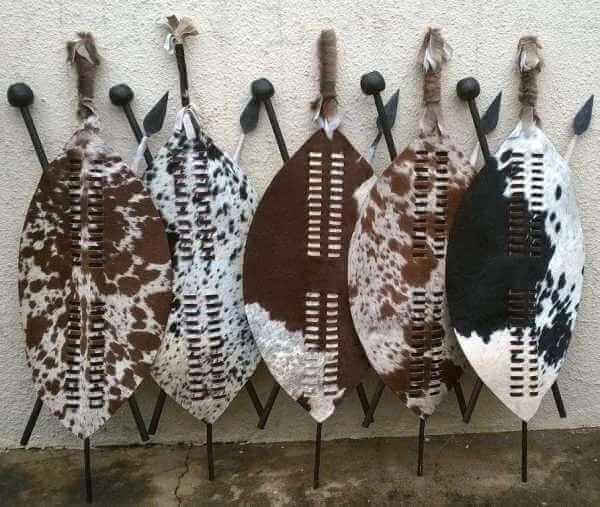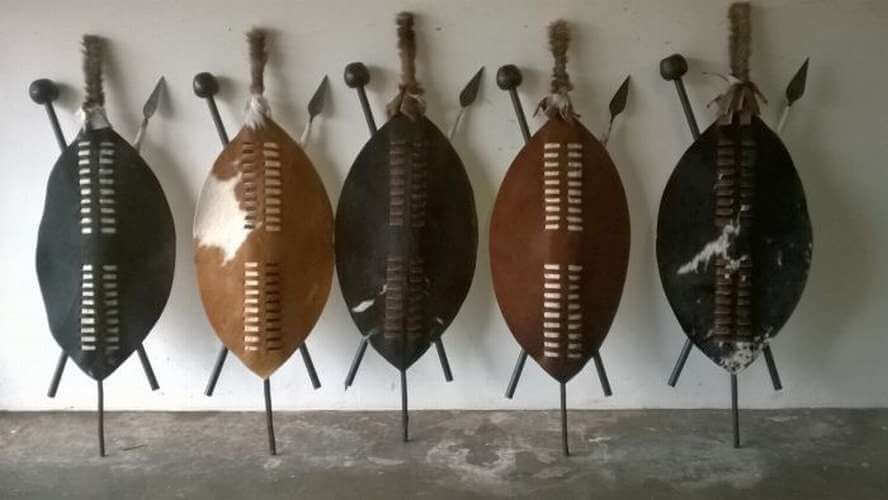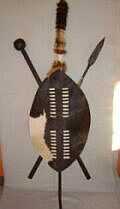History of the Zulu shield



The History of the Zulu shield
AFRICAN CRAFTS MARKET - www.africancraftsmarket.com
Visit our Zulu shields sales page at https://www.africancraftsmarket.com/zulu-shields.html
Traditional Zulu shields date back to King Shaka Zulu and have
been used by Zulu tribesman in battle for hundred of years. As the
modern world has evolved so to has the Zulu tribesman and with this
the Zulu shield is
no longer used in battle and is now used for traditional Zulu
ceremonies such as weddings and funerals. 
Although the modern western world is taking over the African
plains the proud Zulu traditions are still strongly practiced at
traditional ceremonies. The Zulu
people are a strong proud nation from KwaZulu Natal in
South Africa and comprise of a population of around 9 million and
are the largest ethnic group in Southern Africa. 
Zulu shields have played a vital role in the traditional Zulu's battles and have always been handcrafted from cowhide or more commonly known in Zulu terms as Nguni cattle. Nguni cattle are native to Southern Africa and play an important role in the daily living of the Zulu people. Nguni cattle are a currency in Zulu traditions and will determine the wealth of a Zulu man by the cows he has. When a young man intends to wed, he has to first pay the father of the bride a set amount of cattle agreed between them before he can have her hand in marriage.
There are 5 types of Zulu shields, which are each used for
different occasions
Ø 1 - Isihlangu - The large battle shield used by King
Shaka Zulu. This is about 5ft in size (1.5m)
Ø Umbumbuluzo - The small battle shield that could easily be
held in one hand when attacking
Ø Ihubelo - A small courting shield often this is died a red
color
Ø Igqoka - A small dancing shield that is used at
traditional Ceremonies
Ø Ihawu - A difficult rare shield to find.
The Zulu shields are all made from cowhide and although you can find shields made from other hides such as Zebra and Kudu these shields would not be considered authentic Zulu shields. Only cowhide is use.
Cowhide color patterns will play a role in who has what Zulu
shield. The rare large white color shield will be kept for a Zulu
chief or a high-ranking Zulu warrior and the more common color such
as Black and white would be for a normal Zulu warrior. This would
help in battle to know who was in command in the confusion of
fighting.
2 clubs and a center shaft usually would accompany the Zulu shield.
Ø The Spear - known by the Zulu people as Assegai
Ø The Ball club - Known by the Zulu people as the Knob-Kerrie
There is also a long shaft that runs down the center of the shield, which is removable known as the Mgobo. This shaft would have 2 purposes
Ø Would give the Zulu shield extra support as it would
slide behind the shield and would keep the Zulu shield hide from
bending
Ø Also the center shaft would be long enough so that the
Zulu warrior could rest his shield on the ground yet in a vertical
position while holding the shield in front of him, as protection
and he would not have to keep the entire weight of the Zulu shield
held up by his arms. This would enable him to save is energy and
strength during battle.
Not only did the shield give physical protection, but protection of
a symbolic nature was implied as well. Shields were seen to have
medicinal, magic powers. Before battle, shields were sprinkled with
herbs (muti). This was done to increase the protective power of the
shield, to ensure that the warrior came to no harm.




A selection of a few Zulu shield choices available from African
Crafts Market.



Click here Learn about more African tribes and traditions
The Ashanti tribe ~ The Bushman tribe ~The Maasai (Masai) tribe ~The Ndebele tribe ~The Shona tribe ~ The Teke people / Kidumu tribe ~The Zulu tribe
AFRICAN CRAFTS MARKET is a company situated in South Africa that has many Zulu pieces of art available for sale, from the lovely Zulu bead work and grass weave baskets through the traditional Zulu shields. To view the items that may be of interests to you go to our gallery pages on our website at www.africancraftsmarket.com








